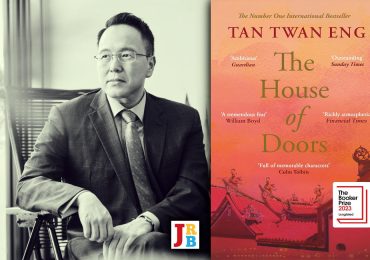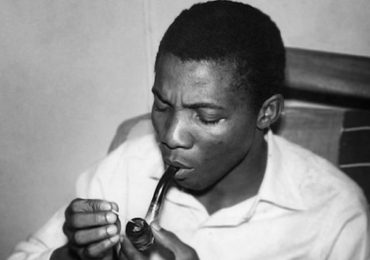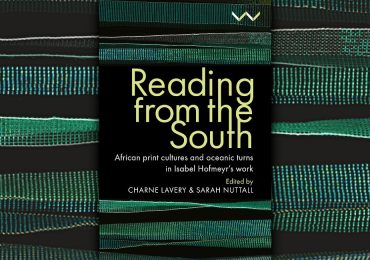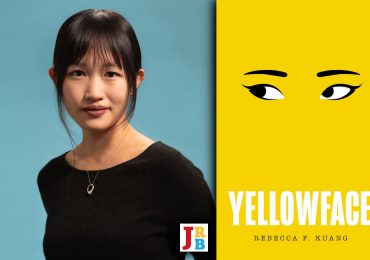The Kenyan novel is not dead, writes Carey Baraka, as long as Yvonne Adhiambo Owuor keeps writing.
1.
On June 1st 1963, Haroun, an almost-Oxford man, and his new son-in-law, Muhidin, a fisherman, sit in the elegant lines and spaces of Muhidin and his bride’s new house, a wedding present from Haroun, talking about the new country.
‘We are now Kenya,’ Father-in-Law once said of the new flag fluttering on the pole of the repainted administrative shed.
‘So?’ Muhidin had replied in Kibajuni. ‘Will it improve the supply of fish?’
This, Muhidin’s question, lies at the heart of The Dragonfly Sea, Yvonne Adhiambo Owuor’s 2019 novel. There is a country, yes: but does this country improve its citizens’ lives?
2.
In a conversation I had with a Kenyan writer a few weeks ago, we expressed the joint conviction that the Kenyan novel was not dead. After all, work was being produced. Owuor had published a previous novel in 2013, and as long she kept on turning out books the survival of the form was guaranteed. This is, perhaps, unfair to others—writers such as Stanley Gazemba and Peter Kimani have recently published novels. But of the much-vaunted Kwani? generation that from circa 2003 onward was to spark a literary renaissance in the country, with its big, important novels, Owuor is the only writer to have released a novel since that time.
Owuor first came to prominence with her 2003 Caine Prize win, for her short story ‘Weight of Whispers’. However, to many in the Kwani? cohort, what might be called her writer-ness emerged much earlier, when, in the forums these writers shared in the years before Kwani?, she wrote and shared essays, under a pseudonym, that, among other things, queried what it meant to be Kenyan. With her two novels, Dust and The Dragonfly Sea, Owuor undertakes the same task a step further, querying not only what it means to be Kenyan, but also what it means to bear the other identities, including political ones, she cares about.
Dust, her debut novel, opens with a death. Moses Ebewesit Odidi Oganda, the son of Nyipir Oganda, is killed by police officers after a gun battle and chase on the streets of downtown Nairobi. In another writer’s hands, this would be the story. In Owuor’s hands, this is not so. In her telling, Moses Ebewesit Odidi Oganda is a brilliant ex-rugby player whose nickname is an ode to a war that ravaged post-independence Northern Kenya; an engineer whose confrontation of government functionaries—after the country’s dams are emptied so as to simulate the low capacity that would necessitate the importation of over-priced generators, whose importation fills the same officials’ pockets—leads to the loss of his job and status. Nyipir, one must add, is not just Nyipir. Rather he is Nyipir Oganda, ex-colonial assistant vigilante officer, ex-government torturer, ex-government torturee, retired gun-runner, cattle rustler and poacher. And the police officer who cradles Moses Oganda’s head as he dies on the street is no mere cop, but Petrus Keah, a senior man in the country’s security setup, the same man who tortured Nyipir, and countless others, after the 1969 assassination of Tom Mboya.
In his now seminal essay from 2000, the critic James Wood mocked this type of writing, derided the sprouting of stories and sub-stories on the page as hysterical realism—the kind of overloud writing that, in his view, was running away from the responsibilities of storytelling. But that critique is not relevant here, for this street-scene sketch stands as an ingenious précis for Owuor’s entire oeuvre. It encompasses Kenya’s colonial history; the otherness of certain landscapes in the country (including what economist David Ndii has dubbed ‘the Chlorophyll Zone’, a swath of land stretching ten kilometres out from either side of the Kenya–Uganda railway); military and sub-military concerns; and the writing and rewriting of history. This is Owuor’s checklist, a list that would, in the hands of a lesser writer, merely lead to confusion.
In Dust, Owuor’s Chlorophyll Zone is Northern Kenya; in The Dragonfly Sea, it is a duality: first, the Kenyan Coast, especially vis-à-vis its relationship with Kenya-Kenya (Nairobi, mostly); and then Kenya as a whole, with respect to its relationship with China. April Zhu notes of The Dragonfly Sea that:
At the centre of this story is a question: how does one complicate the present ‘return of China to Kenya?’ ‘China in Africa’, a category so broad it means nothing (or, rather, chooses only politically important meanings), is meant to embody an impossible multitude of stories: aid and debt, migration, proliferation of informal and illicit trade, cultural diffusion, cultural imperialism, demographic anxiety, racism and coloniality. But coverage of these issues is so often flattened to a geopolitical plane populated almost entirely of elite men, one that exists in official, poorly translated English on banners, speeches, press releases and mottoes.
Even before the publication of Dust, Owuor was thinking about the China-Kenya or China-Africa complex that she returns to in The Dragonfly Sea. In 2006, Owuor, together with the academics Mshai Mwangola and Wambui Mwangi, was at the core of a team of Kenyan thinkers and intellectuals brought together under the auspices of Aga Khan University to consider the African connections historically formed with people from across the Indian Ocean. The work eventually culminated in an Indian Ocean symposium and festival held at the university.
In The Dragonfly Sea, students at the Chinese university where Ayaana, the protagonist of the book, studies have an argument about the etymology of the world’s third-largest ocean. Indian Ocean, Ari, a student from India, declares it is called. Ayaana, Kenyan, calls it Ziwa Kuu (Ari dismisses this as ‘Oogle Boogle’). A student from Indonesia calls it Ratnakara. The lecturer of the class, incensed by the entire conversation butts in. ‘The Western Ocean. You are in China.’
You are in China, so China sets the rules, is the message. Ayaana, née Ayaana of Pate Island, Kenya, is now The Descendant, and her mother, not a descendant herself, Mother of The Descendant. The Descendant grapples with her who-ness, her sense of being. ‘Will the bones of our ancestors on your island be returned to China?’ she is asked by an audience member in a session on Chino-Africa relationships. Unaware of the reconstruction of her identity, Ayaana answers, ‘No, they belong to Pate now.’ (Pate Island is reputed to have a connection with Chinese explorers of the fourteenth and fifteenth centuries.) A mistake. After this, she is barred from answering questions. In future, once her re-education is considered complete, she is fed an answer to give: ‘Everything in time.’
Shu Ruolan is the person tasked with initiating The Descendant into the idea of China. But Shu Ruolan’s idea of Africa is in turn distorted, based as it is on the writing of a slaughter of revisionists: Paul Theroux, Ryszard Kapuściński and VS Naipaul. So, perhaps it is not a surprise that the relationship between Ayaana’s Pate and Ayaana’s China is troubled. When Ayaana returns home from China, she is aghast at all the Chinese-inflected changes in the area: the closing of the ‘eternal’ Mkanda Channel, and a new harbour and oil pipeline, to be built by the Chinese; that ‘a Chinese-built coal factory would rise in pristine Lamu and turn the island black and bleak’. When the ship’s captain Lai Jin comes to Kenya later, he expresses discomfort at the vision of China in the country:
‘I have traversed your country. It is a deep country. In some places … where the roads are built by our China’—a shine in his eyes—‘in the bus I have lied; I said I am from Japan. We design good roads.’
Our China. Whose China? Lai Jin and Ayaana’s? Lai Jin makes sure to rewrite himself, telling the woman he has come to Pate to find: ‘I’m not “China”. I am Lai Jin. A man.’
3.
Writing is rewriting, as the writing workshop maxim goes, and Owuor’s characters rewrite their histories. Witness Ali Dida Hada in Dust, escaping into Kenya from a war in his country on the Horn of Africa, reinventing himself as an intelligence officer in Kenya, and later, for his mission in Wuoth Ogik, the Oganda family home, as a water singer. Observe Mama Suleiman in The Dragonfly Sea, modifying realities into alternate histories, however distended, that fit her purposes. And witness Ayaana herself, presenting herself as Ayaana Abeerah Mlingoti, bearing the names of Muhidin, the father she chose for herself as a small child.
Back to Dust, and here’s the master crafter, The Trader, Zaman Nawfal—informant; peddler of ideas; supplier of women, camels, honey; poacher; adept reworker of history:
Nyipir leans forward, ‘What news of Agwambo? Is he alive?’
The Trader lays out his paraphernalia and stops to tap his chin. ‘It is possible. Me, I only repeat what the radio says.’
Galgalu asks. ‘Chibaki—you know him?’
The Trader purses his lips, his eyes narrow. ‘I sold him two camels—no, no, three.’
‘If a man knows camels, he must be agreeable,’ Galgalu suggests.
The Trader nods. ‘But here is a question: are the camels still living?’
It is hardly conceivable that The Trader knows Chibaki (former president Mwai Kibaki), or that he sold him two camels, or three, or whatever the number in his head. But, in his mistruths, a truth. Are the camels still living? Does Chibaki know camels? If the camels are dead, this Chibaki, is he still agreeable?
Zadie Smith, writing about the artist Kara Walker, remarks that ‘when you make history truly visible, both your own and that of your people and nation, there exists a challenge to show all of it, the unholy mix, the conscious knowledge and the subconscious reaction, the traumatic history and the trauma it has created, the unprocessed and the unprocessable.’ Owuor veers especially in this direction. This country, this haunted ideal, all its poor, broken promises, she writes in Dust. Nyipir, himself the victim of many violences, killed his uncle as a teenager, the strike of his hoe splitting the older man’s skull. Nyipir became a torturer in his country’s security apparatus, as was his eventual torturer, Petrus Keah, as was The Dragonfly Sea’s Mzee Kitwana Kipifit. In Dust, the violences of and in the Kenyan state are what Owuor clings to, but in The Dragonfly Sea, she allows herself to wander into the realm of foreign violences. There’s a touch of the Borgesian sense of the writer here, as when Jorge Luis Borges, in a riposte to those ‘literary nationalists’ who demanded that his writing should abound only with Argentine traits and colour, said that they ‘pretend to venerate the capacities of the Argentine mind but want to limit the poetic exercise of that mind to a few impoverished local themes’.
Suleiman, for instance: once a classmate, and sometimes bully, of Ayaana in primary school, he has now morphed into a global bully. One day, Muhidin comes to Mama Suleiman with reports of a video of her son on hutubu (YouTube). ‘He has a long beard. It is thick, He wears a black headscarf. Very advanced. Many men wear headscarves these days,’ he tells her. ‘He was carrying a grenade launcher all by himself. He has become a strong man. His voice caused the black flag he clutched to flutter. Your son is ambitious, Bi Amina. He is working for the caliphate.’
The caliphate and its ensuing horrors is one of the global themes Owuor pursues in The Dragonfly Sea. Here she is, writing about Fazul the Egyptian, the ultra-fervent revolutionary who plans the 1998 United States embassy bombings in Nairobi and Dar es Salaam. In Owuor’s version, Fazul flees Pate after a violent encounter with an irate Muhidin. And here she is, writing about an attack on a naval carrier (American?) that Tawfiq plans and executes, and the subsequent drone strike that takes out his family, with the exception of his twin brother, ‘the other one of me’, Ziriyab. And here she is, writing about Ziriyab’s detention in a foreign military facility, where he is tortured, a victim of the ‘War on Terror’. And here she is, writing about a Syrian man in a garden in Istanbul—a man who, in throwing his shoe at his quasi-employers and subsequent murderers, the Terzioğlu family, establishes for Owuor, in one fell swoop, a cunning double allusion to the war in Syria, and to another famous shoe-thrower. And here she is, writing about the ship Ayaana travels on to China being attacked by pirates, a ship in whose hold will be discovered the ‘death grimaces’ of lions, leopards, pangolins, zebras and gazelles. And, as a matter of course, ivory.
Nyipir too, in Dust, dealt in ivory—‘They mowed down elephant families, loaded tusks onto lorries with blacked-out number plates. Destination, Singapore via State House’—for which he received his Head of State commendation. In the the dimness of nineteen-seventies Kenya, it was a badly whispered secret that the first family was involved in the ivory trade. Margaret Kenyatta, the daughter of the then-president Jomo Kenyatta, and mayor of Nairobi between 1970–1976, was sometimes called ‘Mama Ivory’. According to a report by the CIA issued on the day Jomo died, both Margaret and Ngina Kenyatta, Kenyatta’s youngest wife, were the largest ivory traders in the country, after obtaining special licences despite the ban on ivory exports into Kenya.
One remembers William Hazlitt and his reflexive distrust of power. In ‘On the Connexion between Toad-eaters and Tyrants’, he offered a template for writerly resistance: ‘be a good hater’. This Owuor excels at. She hates the coiffed dreams those in power handed out to Kenyan citizens at independence. ‘A new word slithered into the landscape—Nyakua: plunder, possess. Entitled brigandage. But it was cleansed to mean “hard work”’. She hates the way these citizens attempted to resituate themselves in the Kenya of the snatched dreams. ‘To protect new post-independent citizen children, parents like him repainted illusions of a “future Kenya”, while shouting out words of the national anthem as if volume alone could recreate reality’. She attacks the vistas these citizens inhabit, and attempts to reconstruct them, to make them better. Wairimũ Mũrĩithi, a Kenyan writer and academic whose thesis was on Dust, told me:
‘She’s concerned with writing about gender outside the overarching frameworks we’ve come to understand as Kenyans, or those that have been forced on us.’
These frameworks, the narrow frameworks foisted upon Kenya by its colonial past and quasi-colonial present, are at the heart of Dust especially. When Ajany asks Nyipir who Hugh Bolton is, he tells her that they ‘shared … trouble’. Trouble here is Mau Mau. Bolton talks about this trouble with his wife, Selene, saying, ‘My people created this country, I’ll be damned if I’ll be forced out.’ This white, colonial framework is what Owuor’s contemporary the late Binyavanga Wainaina harked to in his short story ‘Ships in High Transit’, when he has a character, in response to a query by a white tourist about recommended literature from Kenya, offer the suggestions of Kuki Gallmann and Karen Blixen. In the world, certain ears are bigger than others.
Bolton is another version of Gallmann and Blixen. He offers, for instance, his list of vitu vishenzi: vile things. Vitu vishenzi: wolf spiders, unmade camp beds, lukewarm tea, a raging bull elephant. Mosquitoes and tsetse flies. Watu washenzi. Mau Mau. Colonial District Officers. Men who walked naked. Adorned women who walked like men.
Vitu vishenzi: the Chlorophyll Zone.
In The Dragonfly Sea, an attempt to add a veneer of respectability to the Chlorophyll Zone finds its conduit in the rea-life Lamu Port-South Sudan-Ethiopia-Transport (LAPSSET) megaproject. ‘The kaffirs in Nairobi have given Manda over to them’, a resident of Pate says to Ziriyab. The politics of development work from the outside coming in, excluding any supposed beneficiaries from decision-making. As the thinker Dalle Abraham argues:
The vision for LAPSSET comes from a specific place and history. Unless it confronts that history without wishing to turn it on ‘its head’, it will always be problematic. No matter how gorgeous the stories sound and how glamorous the pictures coming out of the North are, the fact remains that the primary beneficiaries of these ‘developments’ are the elites in Nairobi.’
Again, for Owuor—vitu vishenzi: the Chlorophyll Zone.
4.
Once, in 2018, in the middle of the day, Owuor was waiting for a cab near a mall in Nairobi. While waiting, she was eating some fruit. Then a group of men attacked her. When she tried to free herself, they dragged her into a nearby car. Later, it transpired that the men were officers from the County of Nairobi, in the middle of a crackdown on hawkers in the city. They arrested Owuor and charged her with, among other things, resisting arrest, hawking fruit without a license, and being verbally abusive to an officer of the law. After a court case that dragged on for over a year, Owuor beat the charges. But, because it was Owuor, winning the case was not enough. She had, while the case was ongoing, inspired a group of people around her to investigate allegations of criminality in the Nairobi County office, as well as a pattern of incidents of unlawful arrests of Nairobians by the same council.
In a conversation held shortly before she was attacked, Owuor told me how she had had to remove certain things from Dust, to censor herself as a requisite to having the book published. Even so, see the things that survive. The three Big Men in the book are all security officers: Nyipir, torturer (among other things); Petrus Keah, torturer with hints of Wagalla about him (among other things); Ali Dida Hada, on paper a humble cryptanalyst, in reality a man with thirty-six million shillings in the bank, and the owner of various businesses throughout the country, ill-gotten gains from his and Nyipir’s illicit dealings.
Adam Gopnik, rewriting the famous WB Yeats dictum, advises: ‘The best often share the passionate intensity but can’t be heard, because the worst have a smartphone with a Twitter app’. Yet here is Owuor, with her passionate intensity, fighting to be heard, in a voice that, while perhaps not as loud as the besmartphoned #KOT (Kenyans on Twitter), reverberates through her novels, and in the modes of media that she does take part in. See, for instance, The Elephant, whose ethos is a call to ‘preach truth to power’, a media platform that Owuor was a founder of and on whose board she sits, a platform about which she told me, ‘I am of the school that the media models have to change, certainly in Kenya. And The Elephant is an experiment with a media model for this epoch. I love frontier-edge exploration.’
Turn to Dust again, that wonderful ode to the confluence of history and politics, that tome of beautiful sentences, and here Owuor is sharing things that ought not be shared:
A central province was emptied of people who were renamed cockroaches and ‘beasts from the west’.
Or
Then one night a government man drove into town from Nairobi. He carried petri dishes of vibrio cholerae. He washed these in a water-supplying dam. Days later cholera danced violently across the landscape…
She mocks CNN and its ‘Africa specialist’ from Louisiana, a man ‘whose accent clangs all over his disapproval’. (Here, one also remembers KOT’s hashtag campaign #SomeoneTellCNN from a few years back, a Twitter event that Nanjala Nyabola’s book Digital Democracy, Analogue Politics delves deeply into.) She also gives us an elegantly-named establishment, Gloria’s God Gives salon, whose clientele chatter profanely about Kenyan politicians:
Politics, where politicians have names linked to habits: the drunkard whose wife beats him? The slut who has three children with this secretary? The drug dealer running after the newsreader who is younger than his daughter? Which one? The fool who shot his driver? The election bandit? The murderer found dead in his pool?
Even as one rolls one’s eyes at the sordid melodramas of Owuor’s characters, one can’t help but notice the rewriting of stories, both by and about the characters. Ajany walks out of a club one night serenaded with chants of malaya (prostitute), but when she comes back the next night with a white man in tow, she becomes ‘madam’. In The Dragonfly Sea, Ayaana and Munira attempt to brush away all memory of Ayaana’s rape by pretending that there had been no Thursday evening. When Lai Jin converts to Islam, the imam tells him that he does not have to change his name—‘He could still be Lai Jin. He replied that he could also be Jamal. And so he was both.’ Or, in Dust, Akai taking one look at Isaiah Bolton, the son of the man with whom she shared a romantic affiliation, and asking, ‘Is that Abdulkadir’s son? The chicken thief?’
And yet, with all this restorying, a boatman tells Nyipir, ‘Every lake holds the memory of its mother, it is to her it strives to return, imagining roads that we follow home.’ Memory is cyclic, despite the attempts we make to rewrite it. Yapitayo hayageukani; yajayo hayaelimiki. The past cannot be changed; the future cannot be known.
Galgalu does change the past though, offering Isaiah Bolton an alternate history of the older Bolton’s death, translating and embellishing what he thinks Isaiah should know:
‘Mister Bolton he hears his two children with Akai-Ma is died, much sorrow, So he falls on his gun and it misfires.’
This same Galgalu calls Ajany his Ch’uquliisa, reminding us of the song of one of the barges of the Chlorophyll Zone. Thamenn att irr tettu qaloo siinn chapti wo bath, ch’uquliisa, the song goes. The branch you are perched on is weak, it will break under you, oh dear ch’uquliisa. Ijolenn arma jaloo dakhaan si haati bath, ch’uquliisa. Children of this place are rude, they will pelt you with stones, ch’uquliisa. In the original version of the song, Abdullahi Jirma’s Ch’uquliisa is partly a lost love, partly a bird, the superb starling, which he warns about the dangers it will face in life. One can’t help but think of Owuor’s retelling as a warning too, albeit about history, and how if its branches are weak, it will break under us.
- Carey Baraka is a writer from Kisumu, Kenya. His writing has appeared in, or is forthcoming from, Jalada Africa, Popula and Guernica. He was a founding member of Enkare Review. He sings for a secret choir in Nairobi.






One thought on “Yvonne Adhiambo Owuor’s weight of whispers—Carey Baraka considers Dust, The Dragonfly Sea and a novelist’s mission to retell the ‘vile things’ of history”